- Home
- Courtney Milan
The Turner Series Page 48
The Turner Series Read online
Page 48
“Sir Mark, the MCB wanted—” That was James Tolliver, but what the MCB wanted was swallowed up in further clamor.
“Sir Mark!”
“Sir Mark?”
“Sir Mark, I—”
“Silence!” Mark finally shouted. “Please, all of you. Can you not speak to me one by one?”
Of course, they all apologized. All at the same time. Mark pointed at people then, going through their concerns as carefully as he could. He was mindful of Mrs. Farleigh at the edge of the crowd. He’d promised to see her home. It was the only thing that helped him keep down his temper.
No, Mrs. Cadfall, he would be unable to come to dinner. Also, he knew nothing about cattle—any other person would be a better choice than he was. Truly.
“As for you, Tolliver, what is it you wanted?”
Tolliver winced, and Mark realized he’d let himself become a little short with those around him. He took a deep breath and reminded himself that there were worse things than being well-liked.
“The MCB thought we might sponsor…a debate, or some such.” Tolliver looked down, scuffed his shoes against a paving stone. “We thought it might encourage chastity.”
“A debate?” Mark asked. “For the MCB?” He didn’t particularly like the idea of the MCB. He disliked the secret hand signals, the cockades. He especially didn’t like the handbooks that the founder was selling for tuppence. The whole thing smacked of exploitation, and Jedidiah Pruwett had attached Mark’s name to it. “You want me to join a debate?”
His displeasure must have come across in his tone, because Tolliver wilted further. Mark wanted to kick himself. It wasn’t this youth he objected to, it was—
“You’re right,” Tolliver said, dispirited. “I hadn’t given the matter any thought. Who, after all could possibly take the other side from you? It’s not as if you could debate chastity, after all.”
This, said glumly, cast a pallor on the waiting crowd.
“Come now,” Mark said. “It’s not so bad as that. There are plenty of—” He shut his mouth again, before he came up with a justification for the debate and the MCB.
“Plenty of what?”
“Plenty of arguments one could make at a debate,” said a voice to his right. Mark felt a tingle travel down his spine. He turned slowly to see Mrs. Farleigh at the edge of the crowd. Nobody moved to let her through.
Tolliver frowned. “Such as?”
She shrugged, nonchalantly. “Well. I shouldn’t know them. But a hypothetical debate might say something about an organization that privileges the wearing of ribbons and armbands over any actions that had meaning.”
Mark couldn’t argue with that. “Go on.”
She met his eyes. “And I suppose someone—not me, of course—might even take to task a moral system that rigidly emphasizes adherence to a few select principles, without any attempt at considering the relative value of those principles in individual circumstances.”
Tolliver frowned. “What sort of individual circumstances could you mean? If it’s right, it’s right. If it’s wrong, it’s wrong.” He shrugged. “What’s to argue?”
“Oh, certainly. I could not make such an argument. But a skilled debater might ask what one would do if one were forced to choose between saving an innocent child’s life or engaging in unchaste behavior.”
Tolliver’s frown deepened, and he rubbed his chin.
“This is, after all, the choice that some unfortunate women are put to—sell their bodies, or see their children starve.”
Tolliver’s eyes grew round, and his mouth screwed up. Had nobody ever posed him a basic moral dilemma before?
“I— That is—” He glanced over at Sir Mark in supplication. “I’m sure that’s wrong, because…because…”
Mark took pity on him. “Yes,” he said briskly. “It’s the old ‘tupping for kittens’ argument. I hear that one a lot.”
She choked. “Tupping for which?”
“Kittens. It usually goes like this—suppose that a madman has sixteen precious, innocent kittens in a sack. He threatens to throw them all in the river to drown unless I engage in intercourse with some woman, who is agreeable. What do I do?”
Mrs. Farleigh stared at him. “What do you do?”
“Assuming those are my two choices—tup, or the kittens shuffle off this mortal coil—well, it’s simple. My moral code is not so rigid that I would let innocents suffer.”
“But—”
“I would also tell lies, strike another man in the stomach and blow my nose in the Queen’s presence. All for the benefit of kittens.”
“Lucky kittens,” Mrs. Farleigh managed. She was doing a poor job of suppressing a smile. Around her, the crowd shifted in confusion. Mark wanted to see her laugh.
“I admit there are some times when chastity is not the right answer. You see? You have me there. In most circumstances, though, there are no kittens. No madmen. There’s just a choice to make, and a simple one at that. One mustn’t justify day-to-day morality with extraordinary circumstances. Otherwise, we would all feel free to rape and murder at the drop of a cat.”
Stunned silence reigned. But he’d won. The corners of Mrs. Farleigh’s mouth curved up. “You’ve convinced me,” she said. “No debate is possible.”
She was mocking him with that. It had been a long time since someone had questioned him. It had been a very long time since he’d had this much fun.
“In any event,” she added, “if one wants to save kittens, I suppose it’s more effective to beat the madman into smithereens.”
“Still, if I’m ever faced with the prospect,” he said casually, “I’ll think of you.”
Her eyes widened in shock. In fact, everyone’s eyes widened in shock.
Had he really just said…? Oh, yes. Yes, he had. In front of everyone. He could feel his cheeks heating.
Mrs. Farleigh was the first to recover. “Don’t,” she replied solemnly. “Impending kitten death would ruin the atmosphere. Besides, you’ve convinced me. Your moral code seems not just flexible—in fact, it might be a bit floppy.”
If it had been silent before, it was like death now. Actually, some wicked part of him whispered in response, I have no problem being rigid, too, if that’s what the situation demands.
Thank God that this little public slip had happened in Shepton Mallet rather than London. People here would talk—but gossip would alter their words entirely. And while the gist of the conversation might be repeated in shocked tones from here to Croscombe, at least it wouldn’t be trumpeted in every paper by breakfast tomorrow.
As if conjured entirely from his imagination, a thin weedy voice spoke. “I say, Sir Mark. Could you repeat that?”
No. No. It couldn’t be.
The owner was hidden by the crowd. But Mark knew the speaker all too well. He could see the fraying edge of a top hat at the very edge of the group, obscured by heads and shoulders.
Nigel Parret. What was he doing in Shepton Mallet?
No point even asking the question. Parret pushed through the crowd, closer to Mark. He held a tiny notebook in one hand and a pencil in the other. He looked up at Mark. No man with a mustache like that should ever try to look innocent, Mark decided. It could never work. Besides, Mark knew the man all too well. Nigel Parret was not just a reporter. He was the worst kind of gossip.
“My dear Sir Mark!” Parret shouldered in front of Mrs. Farleigh, casting her a glittering look that Mark could not quite decipher. “It has been so long. So, so long since we last spoke!”
It had been weeks, glorious weeks, since Mark had last brushed the man off.
“Perhaps you could tell me your feelings on seeing me after such a lengthy vacation?”
“Certainly,” Mark said. “Two words.”
The reporter’s pencil poised over paper. Ten thousand people really would read those words, if Parret had his way.
“Push. Off.”
Parret looked up. “Sir Mark. That’s not a very kind thing to say. And w
e are such friends, are we not?”
Mark simply stared at him.
“Now,” Parret said, “what were we saying then?”
He looked up through the crowd and caught Mrs. Farleigh’s eyes. Mark could feel his minor flirtations, all the nascent like he felt for her drying up. Nigel Parret could ruin Mrs. Farleigh faster than Mark could decide what he wanted with her.
He’d imagined seeing her home from church. He’d imagined conversations. Walks outside. Oh, very well—he’d imagined more, but what he’d truly yearned for was not the touch of her hand, but to break through the brittleness of her facade. He’d wanted to slowly come to know her—all without the entirety of London watching in vicarious interest.
“We weren’t saying anything,” Mark said coldly. He tipped his hat to the crowd, avoided Mrs. Farleigh’s eyes and gave the man a jerk of his head.
Not now. Maybe not ever.
He watched her go out of the corner of his eye, letting the village conversation swell up around him.
No. No. He wasn’t going to let this one slip away. Not without a fight.
Chapter Eight
JESSICA HAD NOT YET finished her breakfast the next morning when her maid interrupted her. “He’s here to see you,” she whispered.
It took Jessica a few moments to realize who the woman meant. Sir Mark had not walked her home after service, as he’d promised. After their too-public exchange—and after Mr. Parret had appeared—he’d seemed to abruptly lose interest in her.
Her heart thudded painfully in anticipation. What was he doing here, and so early in the morning? Her hair still hung loose around her shoulders, just brushed after being taken from its braids. She didn’t take the time to put it up, instead ducking out to the front room of her cottage.
Sir Mark stood there, contemplating the items she had on her shelf: two porcelain figures that she’d obtained over the past seven years, and one broken shell—a present her youngest sister had given her nine years ago, and her only memento of home.
“Sir Mark?”
He turned to her. For a moment, he simply froze in place, his mouth open. Then he shook his head.
“Oh, that is utterly unfair. I came to make my apologies, and make amends. But that—that is utterly beyond the pall. I don’t think I can ever forgive you.”
“What? What did I do?”
He rubbed his forehead. “Never mind. I came to ask you whether you had any interest in taking a walk with me this morning.”
“Sir Mark, I feel that I must remind you of the last few words we have exchanged. Twenty-four hours ago, you announced to an entire crowd that you wanted to have intercourse with me. This morning, you tell me that I am appalling. Now, I’m supposed to step out with you?”
He looked up into the corner of the room and then shrugged. “That’s pretty much the lay of the land, yes.”
“Do you know what people are going to think if they see us together after what you said on Sunday?”
“I’m not planning to see people. We’ll see cows.” He sighed. “Besides, one advantage of having a sterling reputation is that no one thinks the worst of you. Even when you’re thinking the worst of yourself.” His gaze slipped again, down to her waist, below, and then slid up to her face. “I must ask one question. Have you ever cut your hair?”
Suddenly, the disjointed nature of his conversation began to make sense. “No.”
“Hmm,” was all he said.
“I need to go put my hair up. Get half boots and a spencer.”
“Yes,” he said absently.
“I’ll just slip out the back, while you’re waiting, and fetch a pig to serve as chaperone, too.”
“Mmm-hmm.”
“She breathes fire,” Jessica clarified. “The pig, not me.”
He looked up, shaking his head. “My apologies. What were you saying?”
“If I had challenged you to a debate and taken my hair down, would you have been able to string together one coherent sentence?”
His eyes rose to meet hers ruefully. “What do you think?”
She clucked sympathetically. “Never mind.”
But in her upstairs room, with her maid pinning her hair into a ruthless bun, she could make no sense of it. Sir Mark liked her. This didn’t surprise her; men usually liked looking at her. She was accustomed to that much.
But he was not like other men. He wasn’t indifferent, not in the least. But for all that he claimed to be attracted to her, he’d rejected her advances. What kind of man did that? If he didn’t plan to take her to bed, what did he want from her? And if he did want to take her to bed, but refused for chastity’s sake…why was he throwing himself in temptation’s way?
She had uncovered no answers by the time she descended the stairs one last time. He didn’t offer her any. Instead, he guided her up the lane, away from the water. From her cottage steps, if she listened carefully, she could make out the distant clack of wool-mill machinery. The rumble was soon swallowed up by the sound of the country. It was never silent; the rustle of wind through leaves was punctuated by the call of birds and the hum of insects.
Up a hill, over a stile, across a pasture, thick with purple-flowered thistles that crunched under her half boots. He followed a trail that did not seem to be outlined by any path. They went down one hill, crossed a narrow brook by means of a wide wood plank and then marched up the incline on the other side.
“I hope you know where you’re going,” she told him after jumping down from the fourth stile.
“We’re going to Friar’s Oven. We’re almost there.”
“I’m not sure if that name is supposed to sound ominous or delicious,” Jessica said.
They were walking through a cow pasture. It sloped gently downward, toward a short rise. Over the top, she could see a long blue horizon.
“Neither,” he said. “These cows have the best view in all Somerset.”
They reached the upward slope again in a matter of minutes. There were a few large rocks strewn about, rose-gold in the morning sun; then a few more. Just as the grass gave way to stone, the rock turned to cliff, falling away at their feet. An immense valley lay before them, and Jessica caught her breath. Somewhere in the distance, she caught a glimmer of blue river.
Morning mist still clung to the valley floor; she could see only a hint of emerald. And in the middle of the mist, a terraced, conical hill rose. Through the fog, she could make out a stone tower on top of that hill.
“That,” Sir Mark said from behind her, “is Glastonbury Tor.”
She didn’t know what it meant. A wild wind blew off the valley, fluttering her skirts behind her, whipping a tendril of her hair free.
“What do you think?” he asked.
“What is it for? Defense? Worship?”
Sir Mark came to stand beside her. “They say King Arthur is buried at Glastonbury.”
She turned to him. “Is he really?”
“Oh, yes. Queen Guinevere died in Amesbury. On nights when there’s a new moon, they say the road between Shepton Mallet and Glastonbury is lit by the torches of her bier.” He pointed into the mist, as if sketching out a ghostly path.
“It is not.”
“My brother and I snuck out here one night when we were young to watch for it. But we fell asleep.” He gave her a wicked smile. “That must have been the moment when she passed by.”
Jessica had lived the past years in London. It had never really struck her before how new the city truly was. After all, it had been burnt to the ground not two centuries past. The buildings out there were terribly modern—new stone, recent construction. But out here, there was something positively ancient in the air. Stones had been set here a millennium before in inexplicable patterns. Battlegrounds had lain fallow and had been turned to the fields beneath her feet centuries before the foundation of her house in London had been laid. It was not quite magical, but perhaps it was a touch mythic.
“They also say,” Sir Mark mused on, “that if you can see Glaston
bury Tor, it’s going to rain.”
Today, the honey-warm stone of the tower was outlined in marvelous precision. She didn’t want to think of rain, not on a day as marvelous as this one. “What a shame,” she breathed. “And if you can’t see it?”
“Then,” he said thoughtfully, “it’s already raining.”
She burst out laughing. “You,” she said, “are very bad.”
“I’ll own as much.” He stared at the tor a while longer and then shook his head. “Guinevere,” he said pensively, “should have held out for Lancelot.”
“Pardon me?”
“She married too soon, you see. It wasn’t Arthur she wanted—she just didn’t know it yet. He seemed like an acceptable fellow—King of all Britain, big army, bigger sword—and so she said to herself, ‘Well, I suppose a king will do.’ She should have waited for Lancelot.”
“But then who would Arthur have had?”
She waited for some acerbic remark from him—something like, a wife who was not an adulteress.
But he scratched his chin pensively, looking off into the mist-filled valley before them. “The Lady of the Lake,” he finally said. “That’s who I would have picked, had I been him.”
“The Lady of the Lake? She’s not even human.”
“Mrs. Farleigh, imagine that you are a man, and a king, and you must choose a wife. On the one hand, you can have a beautiful woman—a very nice one, too—who will respect and fear the power that you wield. One the other, there’s a woman who is a bit frightening, but she has already given you an ancient sword and a scabbard. She’s made you stronger, more powerful. Deep down, you respect the power she wields, and fear it exceeds your own. Whom do you choose?”
“Any man would choose the first—the beautiful woman who fears you. What man wants a woman who overpowers him?”
“A man who is sufficiently strong in his own right need not be jealous of power in others.” He glanced at her. “I know ugly men who insist on ugly wives, believing that they will not stray.” He shrugged. “For myself, I’ve always wanted a beautiful woman.”
She let out a little laugh. “Because you are so beautiful yourself?”

 Her Every Wish
Her Every Wish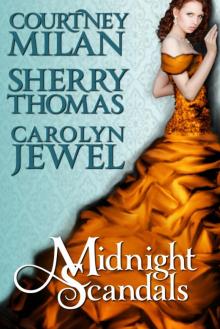 Midnight Scandals
Midnight Scandals After the Wedding
After the Wedding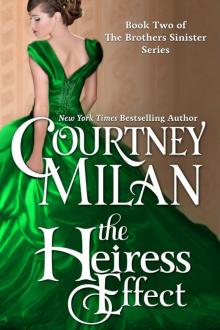 The Heiress Effect
The Heiress Effect Unraveled
Unraveled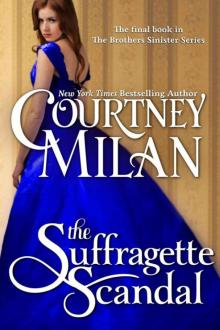 The Suffragette Scandal
The Suffragette Scandal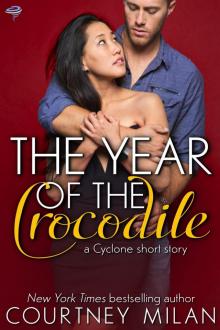 The Year of the Crocodile
The Year of the Crocodile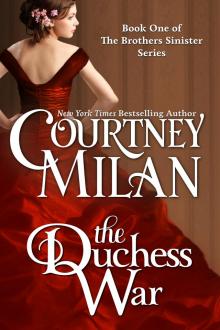 The Duchess War
The Duchess War What Happened at Midnight
What Happened at Midnight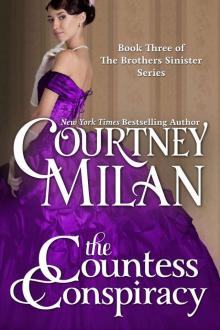 The Countess Conspiracy
The Countess Conspiracy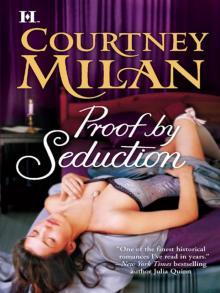 Proof by Seduction
Proof by Seduction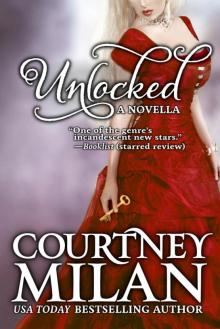 Unlocked
Unlocked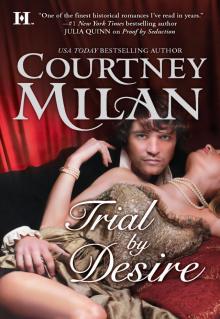 Trial by Desire
Trial by Desire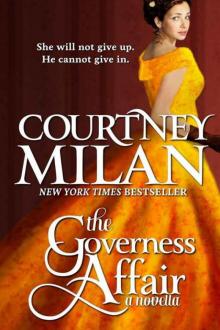 The Governess Affair
The Governess Affair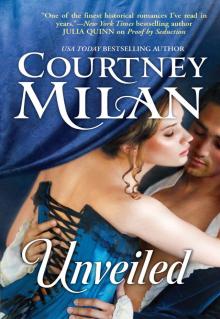 Unveiled
Unveiled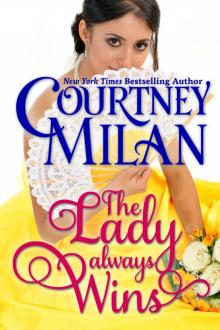 The Lady Always Wins
The Lady Always Wins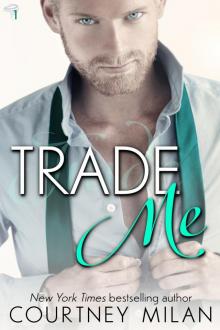 Trade Me
Trade Me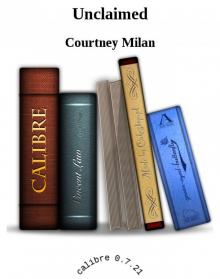 Unclaimed
Unclaimed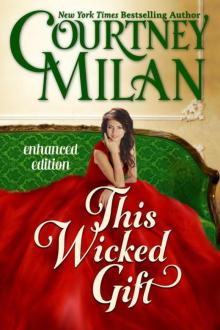 This Wicked Gift
This Wicked Gift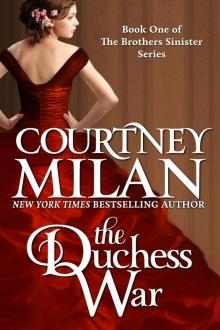 The Duchess War (The Brothers Sinister)
The Duchess War (The Brothers Sinister)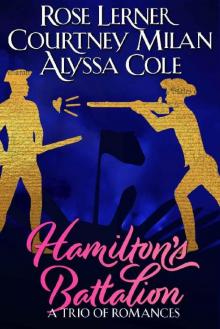 Hamilton's Battalion: A Trio of Romances
Hamilton's Battalion: A Trio of Romances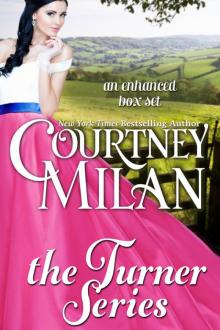 The Turner Series
The Turner Series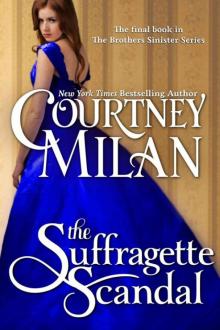 The Suffragette Scandal (The Brothers Sinister)
The Suffragette Scandal (The Brothers Sinister)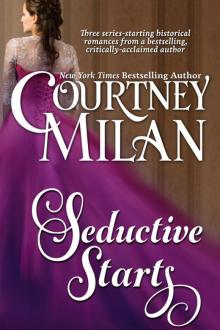 Seductive Starts
Seductive Starts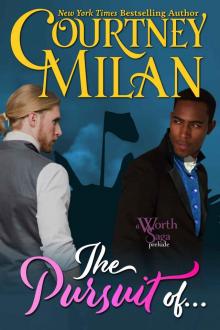 The Pursuit Of…
The Pursuit Of…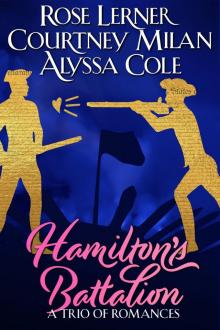 Hamilton's Battalion
Hamilton's Battalion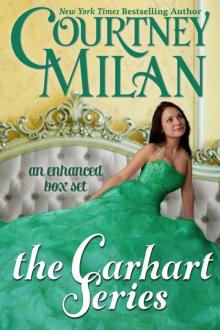 The Carhart Series
The Carhart Series Seven Wicked Nights
Seven Wicked Nights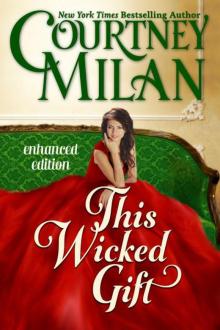 This Wicked Gift (A Carhart Series Novella)
This Wicked Gift (A Carhart Series Novella)